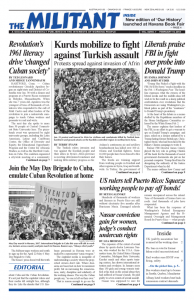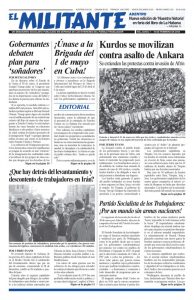SEATTLE — A fight for safety for rail workers and those who live near the tracks is unfolding here as a Seattle engineer took the Burlington Northern Santa Fe Railway bosses to court to win damages and get his job back. James Norvell was fired by BNSF in August 2015 on trumped-up charges of damaging company property. To avoid a disaster in the Willbridge Yard and the surrounding neighborhoods in Portland, Oregon, he had thrown a runaway locomotive into reverse whose brakes had given out.
“The termination followed Norvell’s role in preventing a major catastrophe,” his lawsuit, filed last August, says, “and later exposing BNSF’s dangerous maintenance practices.”
The rail bosses tried to get the lawsuit thrown out of court. But Judge Benjamin Settle in Tacoma ruled the case had merit and set a trial date for Sept. 17. The law “expressly provides a cause of action for railroad employees who suffer retaliation for reporting railroad hazards and misconduct by railroad carriers,” he said.
Norvell gave a 14-minute interview, which is now on YouTube, to KING-TV 5 in Seattle. He explains he was transferring cars from the Lake Yard to BNSF’s nearby Willbridge Yard that night. He had started by moving some highly volatile tank cars into the yard, which already held cars full of flammable material.
He and his crew went back for another move, and he drove a second cut of cars onto a downhill track into the yard. The brakes failed and the cars started moving straight toward the tankers. Norvell told the TV crew that he reversed the engine and pulled all out on the speed, stopping the train.
“If I hadn’t been able to stop the train there could have been a catastrophe in North Portland,” he said. The company said he did thousands of dollars damage to their engine and took it out of service.
Norvell said a number of other engineers told him they also had brake problems, so he went to talk to the mechanics in the yard to try and find out what was going wrong. They told him the company had a “Band-Aid” approach to maintenance. The brakes were going bad on all the switch engines there, they said, but the company thought it was too expensive to take them to Seattle where there’s a crane powerful enough to lift and repair them.
Norvell decided to blow the whistle and went to the media. He was fired. “There are huge issues in rail, the trains are big, they can kill you,” he said. “You need to be able to know you can go to work and be safe.”
The TV crew asked Norvell why he hadn’t spoken out about problems in the yard earlier. He said he didn’t know it was so bad until he looked into the brake failure. And, he said, if you complain, the railroad targets you, looking for a way to trip you up and fire you.
Norvell said he grew up in a railroad family and worked for BNSF over 16 years. He built a 2,000-foot mini-railroad on his property and gave neighborhood children rides.
After he was fired, he moved to Seattle to get another rail job. “They took everything from me,” he said. “So I had nothing to lose.” That’s why he filed the suit.
The TV crew asked him why the company responded the way it did. “Corporate America thinks money is more important than people,” Norvell said. “They figure they can make a buck even if people get hurt.”

